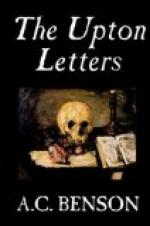The guest whose remark had occasioned this discourse is one of my colleagues, Murchison by name—you don’t know him—a big, rugged, shy, sociable fellow, who is in many ways one of the best masters here. He is always friendly, amusing, courteous. He holds strong opinions, which he does not produce unless the occasion demands it. He keeps a good deal to himself, follows his own pursuits, and knows his own mind. He is very tolerant, and can get on with almost everybody. The boys respect him, like his teaching, think him clever, sensible, and amusing. There are a great many things about which he knows nothing, and is always ready to confess his ignorance. But whenever he does understand a subject, and he has a strong taste for art and letters, you always feel that his thoughts and opinions are fresh and living. They are not produced like sardines from a tin, with a painful similarity and regularity. He has strong prejudices, for which he can always give a reason; but he is always ready to admit that it is a matter of taste. He does not tilt in a Quixotic manner at established things, but he goes along trying to do his work in the best manner attainable. He is no genius, and his character is by no means a perfect one; he has pronounced faults, of which he is perfectly conscious, and which he never attempts to disguise. But he is simple, straightforward, affectionate, and sincere. If he were more courageous, more fiery, he would be, I think, a really great man; but this he somehow misses.
The two men, Foster and Murchison, are as great a contrast as can well be imagined. They serve to illustrate exactly what I mean. Our friend Foster is perfectly correct and admirably pleasant. You would never think of confiding in him, or saying to him what you really felt; but, on the other hand, there is no one whom I would more willingly consult in a small and delicate point of practical conduct—and his advice would be excellent.
But Murchison is a real man; he knows his limitations, but he takes nothing second-hand. He brings his own mind and character to bear on every problem, and judges people and things on their own merits.
Of course one does not desire that conventional people should strive after unconventionality. That produces the most sickening conventionality of all, because it is merely an attempt to construct a pose that shall be accepted as unconventional. The only thing is to be natural; and, after all, if one merely desires to see how the cat jumps and then to jump after it, it is better to do so frankly and make no pretence about it.
But I am sure that it is one’s duty as a teacher to try and show boys that no opinions, no tastes, no emotions are worth much unless they are one’s own. I suffered acutely as a boy from the lack of being shown this. I found—I am now speaking of intellectual things—that certain authors were held up to me as models which I was unfortunate enough to dislike. Instead




